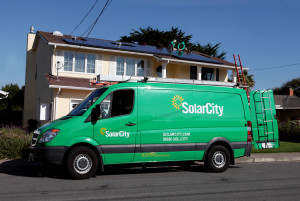Feds to troll SolarCity books while company seeks another $14.6M

By Eric Boehm and Tori Richards | Watchdog.org
Federal investigators will spend the next year going through the books of two solar-energy companies tied to billionaire Elon Musk in an effort to show the businesses overvalued sales contracts in order to claim millions in federal assistance.
WE WERE GYPPED: Installation and leasing companies owned by SolarCity say the feds owe them $14 million.
The government action comes in response to a lawsuit brought by the two companies, subsidiaries of Musk’s San Mateo, California-based Solar City.
SolarCity builds and leases solar-energy systems, and already has received more than $244 million in federal tax incentives. In its lawsuit, the companies say the feds shortchanged them $14.6 million.
“The Treasury has failed to pay Plaintiffs cash grants in the amounts that they are entitled to, thereby materially frustrating congressional intent (of solar grants),” the complaint said.
The lawsuit was filed in 2013 by Sequoia Pacific Solar and Eiger Lease Co., two foreign subsidiaries sharing SolarCity’s California offices. It recently moved into the discovery phase when both sides get to scrutinize each other’s evidence. Federal attorneys plan to review 4,204 of SolarCity’s grant applications, according to a status report filed last month.
SolarCity already is the subject of U.S. Treasury and IRS probes trying to determine the same thing: Did SolarCity deliberately crank up the cost of products to cash in on the government grant program?
A California judge last month gave both sides until December to finish the discovery process. Attorneys say it’s too early to tell if the case will end up in court or will be settled.
But the outcome could have huge consequences for SolarCity and other companies paid through the Treasury’s 1603 grant program, a part of the 2009 federal stimulus. Its 2013 year-end SEC report showed that SolarCity was $166 million in the red.
The plaintiffs said the Treasury “has no expertise or experience in making proper cost basis determinations” and “improperly changed the rules.”
The 1603 program pays a cash grant equal to 30 percent of the value of their investments to owners of solar and other renewable energy projects. This will decrease to 10 percent in 2017. Several states offer additional credits on a per-watt basis.
As Watchdog has reported, the 1603 program is a pillar of SolarCity’s business model. Through the end of 2013, the company received more than $244 million from the federal government for solar-energy systems it leases to businesses, homeowners and other clients. Because SolarCity retains ownership of the systems, the company collects the investment tax credit.
But on projects in Arizona and California, the lawsuit claims, the Treasury changed how it calculated the grant payout after applications had been submitted.
The lawsuit alleges that the Obama administration first delayed payments and then offered “guidance” to California and Arizona that its systems there were valued at $6 per watt instead of $7 on one project and $5 instead of $7 on another. That recommendation affected 2,130 installations.
Jonathan Bass, a spokesman for SolarCity, said the company was forced to file the lawsuit because there is no appeals process built into the 1603 program.
“In some cases, the Treasury Department even changed the rules of the program and applied the changes retroactively,” he told Watchdog. “Our complaint was the only way to appeal the administrators’ decisions.”
The Treasury Department admitted in a court filing that it did not pay the full amount SolarCity’s subsidiaries claimed, but denied anything improper. Instead, lawyers for the government told the court the payments were consistent with the fair-market value of those properties.
A spokeswoman for the Justice Department declined to comment on the case.
The IRS and the Treasury Department investigations began late last year after a U.S. senator demanded answers following a Barron’s expose on the alleged inflated contract values.
SolarCity also has found itself on the other end of the federal court system as a defendant in a class-action lawsuit filed March 28 in Northern California, where its headquarters are located.
The lawsuit accuses the company and two of its officers of issuing false SEC filings and media releases that misled shareholders into thinking the company was in better financial shape than it really was.
The defendants “engaged in a plan, scheme, conspiracy … and courses of business which operated as a fraud and deceit upon plaintiff and other members of the class,” the complaint said.
At issue was SolarCity’s admission on March 3 that it discovered an error in its financial reporting. It found that $20 million to $23 million in expenses for system sales, the largest part of its business, were incorrectly allocated to its smaller leasing business.
Its stock had been trading at near an all-time high of $88.23 and dropped 2 percent on that news. Then on March 18, SolarCity issued a statement that its year-end reports for the previous three years were no longer reliable, causing the stock to plunge another 6 percent, the suit said. It is now trading in the $60 range.
The named plaintiff, Tai Jan Bao, had purchased 100 shares on Feb. 28 at $86.99 per share.
“We are aware of the complaint. It has no merit,” Bass said. “These kinds of cases are filed frequently against publicly traded companies. We will defend ourselves, and we will not let this distract from our focus on the business.”
Contact Eric Boehm at EBoehm@Watchdog.org and Tori Richards at tori@watchdog.org or on twitter @newswriter2







